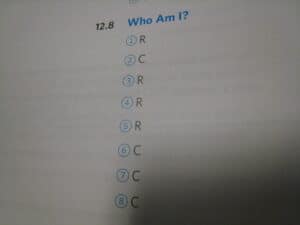Wondering how many subjects in GED? The General Educational Development (GED) test is a comprehensive assessment designed to measure an individual’s knowledge and skills in various academic areas. Consisting of four distinct subjects, the GED test offers individuals who did not complete their traditional high school education an opportunity to earn an equivalent credential.
Each subject within the GED test serves as a crucial component, collectively providing a comprehensive evaluation of a test-taker’s academic proficiency. From language arts and mathematics to social studies and science, the GED test covers a diverse range of subjects, enabling individuals to showcase their capabilities across multiple domains of knowledge. This holistic examination ensures that those who successfully pass the GED test demonstrate a well-rounded understanding of essential academic concepts.
How Many Subjects in GED?
The GED test is divided into four main subject areas and an elective test. The four main subject areas are:
- Mathematical Reasoning: This subject test measures the test-taker’s ability to understand and apply mathematical concepts and reasoning.

How Many Subjects in GED - Science: This subject test measures the test-taker’s understanding of science concepts, principles, and the scientific method.
- Social Studies: This subject test measures the test-taker’s understanding of history, geography, economics, and government.
- Reasoning Through Language Arts (RLA): This subject test measures the test-taker’s understanding of reading, writing, and language skills.
It is important to note that the format and time limit of each subject test may vary depending on the state or jurisdiction where the test is taken. The test-takers should check the official website of the GED Testing Service or the agency responsible for GED testing in their state for more information.
Format and Time Limit of Each Subject Test
Each subject test in the GED is divided into two parts: a multiple-choice section and an extended response section. The multiple-choice section is designed to measure the test-taker’s knowledge and understanding of the subject matter, while the extended response section is designed to measure the test-taker’s ability to apply that knowledge.

The time limit for each subject test varies, but generally, the test-takers will have about 45 minutes to complete the multiple-choice section and about 45 minutes to complete the extended response section.
It is important to note that the format and time limit of each subject test may vary depending on the state or jurisdiction where the test is taken. Therefore, test-takers should check the official website of the GED Testing Service or the agency responsible for GED testing in their state for more information.
Elective Test in GED
In addition to the four main subject tests, GED test-takers also have the option to take an elective test. The elective test is an additional subject test that test-takers can take to demonstrate their proficiency in a specific subject area. This test is not mandatory and test-takers can choose whether or not to take it.
Currently, the GED Testing Service offers elective test in the following subjects:
- Computer Science
- Health Science
- Industrial and Engineering Technology
- Public Services
These elective tests are designed to measure the test-taker’s knowledge and understanding of the subject matter in the same format as the main subject tests. The test format and time limit of each elective test may vary depending on the subject and should be checked on the official website of the GED Testing Service or the agency responsible for GED testing in the test-takers’ state.
Taking an elective test can be beneficial for test-takers who want to demonstrate their proficiency in a specific subject area and to stand out in the job market or when applying to college or trade school.
How to Register for GED Test?
To register for the GED test, you need to follow these general steps:
- Create an Account: Visit the official GED Testing Service website (ged.com) and create an account. Provide your personal information, contact details, and create a username and password.
- Verify Eligibility: Make sure you meet the eligibility requirements to take the GED test. Generally, you must be at least 16 years old and not enrolled in high school. Some states may have additional eligibility criteria, so check your specific state’s requirements.
- Locate a Testing Center: Use the website’s search tool to find a GED testing center near you. Select a testing center that is convenient for you and offers the subjects you intend to take.
- Choose Test Subjects: Decide which GED subjects you want to take. The four subjects are Language Arts (Reading and Writing combined), Mathematics, Social Studies, and Science.
- Select a Test Date: Choose a suitable test date from the available options at your chosen testing center. Keep in mind that different centers may have varying schedules.
- Pay the Fees: Pay the required test fees using a credit or debit card during the registration process. The fees may vary depending on your location, but the official GED website will provide you with the accurate fee information.
- Review and Confirm: Before finalizing your registration, review all the information you’ve provided, including the test subjects, test date, and personal details. Make sure everything is accurate.
- Receive Confirmation: Once your registration is complete and your payment is processed, you will receive a confirmation email with details about your test date, time, and location. Keep this confirmation for your records.
- Prepare for the Test: After registering, start preparing for the GED test by studying the relevant subjects using study materials, practice tests, and other resources.
- Test Day: On the day of the test, arrive at the testing center on time. Bring a valid, government-issued photo ID (such as a driver’s license or passport) for identification purposes. Be prepared to follow the testing center’s rules and regulations.
Remember that the registration process may vary slightly based on your location, so it’s recommended to visit the official GED Testing Service website or contact your chosen testing center for specific details and instructions. Completing the registration process accurately and in a timely manner will ensure a smooth experience leading up to your GED test day.
The Importance of Effective GED Study Strategies

When preparing for the GED exam, it’s crucial to implement effective study strategies to enhance your understanding and performance in each section. Consider utilizing a comprehensive GED study guide that covers all subjects, including science, mathematics, language arts, and social studies. Online resources offer a wealth of information and practice tests, allowing you to tailor your study sessions to specific areas of improvement. Engaging with practice tests online not only familiarizes you with the exam format but also helps you identify your strengths and weaknesses in each subject. This targeted approach allows for a more efficient use of your study time.
Professional guidance can further elevate your GED preparation. Seek out tutors or join online study groups where experienced educators can provide insights and answer your questions. These platforms offer a collaborative environment for sharing information and tips. Remember, a well-rounded study plan that incorporates both independent study and collaborative learning can significantly boost your confidence when facing the diverse challenges presented by the GED exam.
Navigating the Science Section: Tips for Success
The science section of the GED exam evaluates your understanding of scientific concepts, principles, and the scientific method. To excel in this section, focus on honing your analytical and critical-thinking skills. Dive into online resources that provide in-depth explanations of scientific concepts, and consider using interactive simulations to enhance your grasp of complex ideas. The GED study guide specific to science can be an invaluable tool, offering targeted information and practice questions to reinforce your knowledge.
During your study sessions, pay special attention to interdisciplinary connections within the sciences. The GED often presents scenarios where knowledge from multiple scientific disciplines is required to answer questions accurately. By developing a holistic understanding of scientific principles, you’ll be better equipped to tackle the diverse range of topics covered in the science section. Regularly reviewing and practicing with online science practice tests will not only build your confidence but also fine-tune your ability to apply scientific reasoning within the time constraints of the exam.
Beyond the GED: Receiving Your Diploma and Moving Forward Professionally
Successfully passing the GED exam is a significant accomplishment, but it’s essential to understand the steps that follow to receive your diploma. Once you’ve completed all the required sections, your scores will be processed, and if you meet the necessary criteria, you’ll be awarded the GED diploma. This diploma holds the same academic weight as a traditional high school diploma, opening doors to various educational and professional opportunities.
With your GED diploma in hand, consider advancing your education or entering the workforce. Many colleges and employers recognize the GED as a valid credential. Additionally, continue to invest in your professional development by seeking further certifications or specialized training. Online platforms offer a plethora of courses that can enhance your skills and make you stand out in the job market. Whether you’re pursuing higher education or entering the workforce directly, your GED diploma is a testament to your commitment and knowledge, laying the foundation for a successful academic and professional journey.
